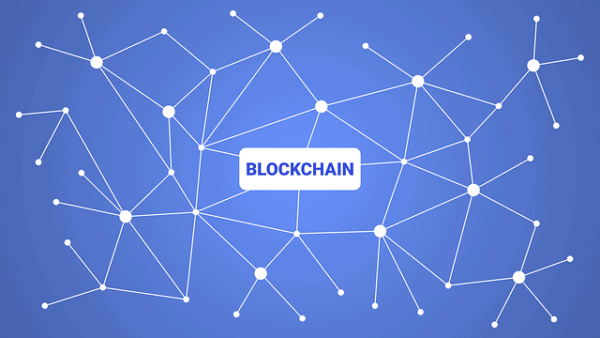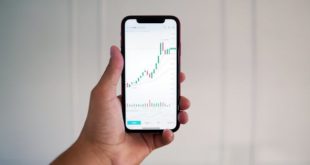
Blockchain is a universal transaction book that allows you to register and track every operation within it, scattered all over the Internet in thousands of unmodifiable copies, in a peer-to-peer model and protected by advanced cryptographic methods.
The easiest way to compare it is to an accounting book – publicly available, global and allowing every user to record and view transactions such as financial transactions, ownership acts or contracts. But the information about who executed the transaction is confidential, available only to the owner of the transaction. The programmable, open character of blockchain technology will allow for a complete reconstruction of the financial sector.
And even more – some of its supervisory and accounting elements will be redundant. Commercial processes, information exchange will become transparent, faster and much cheaper, without the costs of maintaining the entire financial system worldwide. Public trust institutions – banks, stock exchanges and financial intermediaries also see in it a huge potential, but also a threat to the status quo.
Book of all books
One of the most important features of blockchain is that all users who decide to use this “book” have access to a copy of it, and each copy automatically records any changes made within it. Blockchain is a distributed system, which means that there is no central source of processed data in it.
The safety of its use and application, which seems to be its most important feature, results from the application of mathematical algorithms and principles of cryptography. Blockchain can record transactions: sales, exchanges, authorizations, electronic signatures and virtually any operation that involves the validation of any form of asset.
Today it is still about cash register
The features of the “blockchain book” make us think of it as the largest, or perhaps the only database scattered all over the Internet, which can function in our reality. Today, of course, this is not yet the case, but there is a good chance that this will happen.
Experts claim that blockchain, in order to globalize, needs several years of further dissemination and improvement. Today, its development and functioning is seen primarily in the context of the crypto market. The idea of creating a universal book of all operations was born in an environment that created the first currency, Bitcoin (BTC), alternative to the official financial system. It can be said that the world of the cryptocurrency is a kind of laboratory, where all strengths and weaknesses of this technology are verified in constant use.
It is also clear that blockchain may have emerged in an area where transactions require a maximum degree of security and total confidence.
The whole idea of a cryptocurrency, as a tool independent from the central financial system, gained a natural ally in this technology. It is assumed that blockchain technology does not include intermediaries earning money from the client (in practice, they are still there today, but this element of the puzzle should evolve), and the costs of using this system – ultimately – may be negligible. At least in relation to the benefits this can bring to individual and business users.
Blockchain absorbs everything
Blockchain is growing and will continue to grow. This is a technological change that is too high in terms of quality to be threatened with market annihilation. There are many questions that arise during its dissemination, and one of them concerns scalability. And this is potentially unlimited.
For the time being, the benefits of blockchain are most quickly recognised by the financial industry. But we are only at the beginning and the situation can be compared to the moment when the Internet was in the mid-1990s. Nobody imagined at that time that the Internet 2.0 revolution would change the essence of the Internet. Blockchain is still in its first phase of development, but should soon experience a period of dynamic growth, which means that the mechanism will become truly globalised over time.
Perhaps a turning point awaits us next year. It is then that financial institutions can begin to widely deploy tools based on this technology, and the whole process will continue until 2025, when Blockchain reaches a level of usage comparable to today’s Internet access.
Earlier this year, the McKinsey Global Institute published a report in which it pointed to nearly 70 companies that have already implemented blockchain; almost all of them belong to the financial and insurance industries. According to these analyses, the latter should be the main beneficiary of the breakthrough announced by the new technology.
Where are we heading?
At this point, I would like to point out those spheres of reality where blockchain technology should prove itself the fastest and best because of its structural features.
Blockchain is a revolution in the flow of information.
Different models of data organization differ in the speed at which the desired or searched information reaches the user. In many cases, a qualitative change in the functioning of any organisation or its competitiveness vis-à-vis others results from the way in which it organizes the data relevant to it. Better access to them means at some stage, the birth of a new model of functioning of the whole organization.
This is followed by benefits for the management and economy of the company. What is also worth emphasizing – decentralization and sharing information in blockchain, encourage the exchange of data. This has beneficial consequences for all levels of governance and development of the organisation.
Blockchain is transparent.
It is this feature that makes the technology can be used in areas where transparency is desired or even strongly required. Hence the conclusion that the most interested in blockchain may be public institutions, which collect data related to the functioning of offices. If one of the features of our political system is the citizen’s right of access to public information, blockchain can make this promise possible.
Blockchain has unlimited power to process large amounts of information.
Current cloud technology is a trillions of data that are not integrated with each other. Blockchain can merge and integrate them logically. In the case of Internet of Things – where various devices function thanks to continuous, ongoing processing of information, blockchain will work perfectly well. Airports processing numerous information on weather, air traffic, safety, time and passenger control gain a natural ally in it.
Just like intelligent buildings, or even entire intelligent cities (Smart Cities), where electronics manage energy, water consumption, temperature, household appliances, television, alarms, cameras, which – connected to the Internet – generate huge amounts of data. All of these devices work together by processing data, and this technology can make this cooperation reliable. A simple application based on distributed technology can over time control any device or set of devices: from home electronics to large fleets of autonomous vehicles.
In a sense, it is another incarnation of Peer-to-Peer technology. Only a more perfect incarnation. The system of direct file exchange between users has revolutionized the way we use music or film files, and thus greatly reduced the position of all entities that earn money from content distribution. For example, if I can pay for the service directly by exchanging data with the service provider, I don’t have to worry about additional distribution fees. Blockchain can therefore empower a consumer who is interested in lowering the price of services, as well as quick and unlimited access to them.
Blockchain ensures data confidentiality.
In the social dimension, this has a huge significance, espcially when it comes to gambling, betting with blockchain tech is a booming industry right now and we don’t see it in our dull lives. Access to sensitive data, such as health information, for example, must be completely controlled. Blockchain largely prevents data leakage. Breaking access codes and stealing the character system is possible (and happens), but it requires huge computing power. And it costs money. The beneficiary of blockchain technology becomes any institution that guarantees confidentiality to the customer or citizen – e.g. a hospital or an insurance company.
Blockchain is a technology that enables a convenient and secure exchange of information.
Encryption protocols used by this technology make traditional ways of exchanging content, such as e-mail or cloud, less attractive. At the same time, this system enables the publication of all contents and their complete updating, which may have a significant impact on the operation of scientific institutes, for which updating the information is of great importance. Moreover, any institution whose functioning is based on the circulation of invoices, documents, electronic keys, access codes and any authorisation tools should be naturally interested in blockchain. Only not all of these institutions still know about it.
Blockchain can alleviate poverty and facilitate access to the financial market.
There are still many places in the world where people live without access to a bank account. Thanks to this technology, a person who has no physical or economic capacity to use banking services gains a new tool and with it a consumer subjectivity. Using a smartphone, he can pay for all services using a cryptocurrency, which, as we know, demonopolises the financial market and makes the customer independent of banking intermediation. If we imagine that an institution earmarks funds for the development of a selected area, these funds can go into the pockets of a person in need – for example, a farmer who runs a farm in distant parts of the world. All mediation is not necessary.
Is this an utopia?
I have listed above the most important consequences, in my opinion, of the birth and functioning of this new technology. I could point to many other levels of social functioning, where blockchain would work very well. But this would require a much longer text.
I can’t deny that a very mathematical, algorithmic blockchain gives me a sense of uncanny in contact with this technology. A dispersed, secure, widely accessible and trustworthy database, which is becoming the basic and main accounting book of our world – this sounds almost like a utopia. There is definitely something incredible and even unbelievable about it. But this feeling has been with me for a long time. From the moment I started to observe the first manifestations of Artificial Intelligence in our lives.
 Gearfuse Technology, Science, Culture & More
Gearfuse Technology, Science, Culture & More


